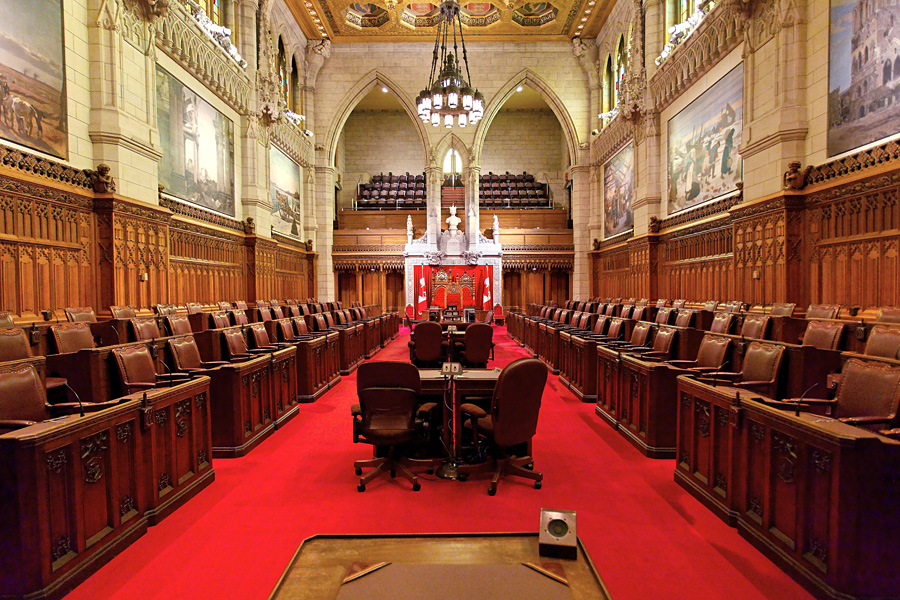
Op-ed: Senate obstruction makes for healthy democracy
The benefits of gridlock
The following is an op-ed written by Royce Koop, associate professor and head of the department of political studies. It was originally published in the Winnipeg Free Press on June 29.
Euthanasia is a difficult, morally fraught issue. It deserved a more serious examination than was afforded by a majority government simply ramming a bill through Parliament.
As it turns out, Canadians did see thorough scrutiny of the Liberal government’s euthanasia plan, Bill C-14, courtesy of the Senate. Rather than simply signing off on the bill, senators took seriously their duty to examine and amend legislation. While the bill received royal assent relatively unscathed, it was subjected to additional public attention as the senators proposed amendments and returned the bill to the House of Commons.
Most importantly, the Senate asserted itself against the government and indicated Canadians should expect more of the same in the future. Senators were incensed when it was suggested they should simply accept the will of the House of Commons. (Sen. Ghislain Maltais responded defiantly: “We are free and independent!”)
Some welcomed the prospect of a more rambunctious, rebellious Senate; others were less impressed. The work on the government’s euthanasia bill earned rebukes from critics claiming the Senate was engaging in undemocratic obstruction. The end result of a more activist Senate, they argued, would be gridlock as the two houses of Parliament butted heads. Governing would, accordingly, grind to a halt. Furthermore, so the argument goes, unelected senators have no business messing with the will of elected governments.
Polls show Canadians hold the Senate in low esteem, so such arguments are often accepted without much scrutiny.
There is something to these arguments: members of Parliament are elected, whereas senators are not. The House of Commons, therefore, enjoys democratic legitimacy the Senate lacks. As a result, the Senate will not often defeat bills approved by the House of Commons. (This is a good reason to elect senators, by the way, but that’s a topic for another column.)
But it shouldn’t be taken too far. The Constitution gives the Senate almost equal powers to the House of Commons. Senators enjoy the constitutional authority to propose, review, amend, delay or block government legislation. Senators excel at reviewing and offering amendments to government legislation — their “sober second thought” role — but have been hesitant to face off more boldly with the government.
The fact senators do not often exercise their powers to the full extent is a curious example of self-discipline that has not served Canada well. This is because Canadian governments, which typically command a majority of MPs in the House of Commons, are simply not subject to sufficient constraints on their powers. Federalism may frustrate some goals of the prime minister, and, as we have seen recently, the Supreme Court may strike down a few laws here and there but these are weak constraints on a powerful government.
In contrast, a confident, assertive Senate that occasionally causes gridlock would be a welcome check on the power of the federal government.
This is particularly true in Canada, where prime ministers that command majority government have for some time been able to whip MPs into voting for the vast majority of bills the government introduces. Academic studies often note the severity of party discipline in Canada, which means the PM almost always gets his way.
It gets worse. Centralization of power in the prime minister and cabinet is one thing. But, in recent years, observers have noted power has shifted above the cabinet to the unelected officials in the Prime Minister’s Office, who may monitor and overrule cabinet ministers.
Do we really need additional constraints on the power of the prime minister in Canada? Here’s a test: how many times in recent history can you recall when a prime minister really, really wanted something, but couldn’t have it? I can count the number of such instances on one hand.
Perhaps it’s time for Canadians to consider the virtues of gridlock and the checks it necessarily imposes on governments. To paraphrase commentator George Will: gridlock is not a problem, it’s an achievement. It means governments are likely to achieve good things slowly and bad things not at all. The former is a small price to pay for the latter.
The Senate is in an ideal position to provide constructive obstruction to Canadian governments that have become far too powerful. I hope we see more of it in the future.






